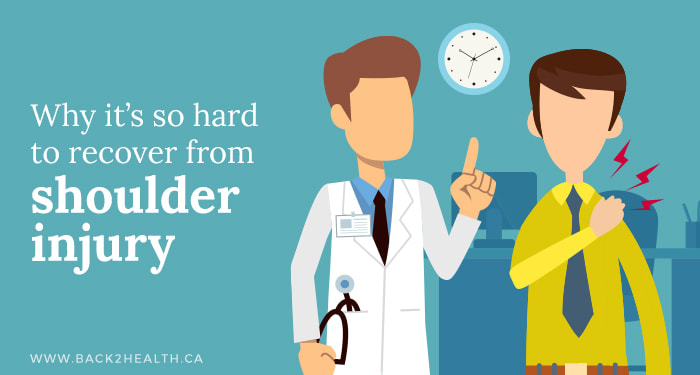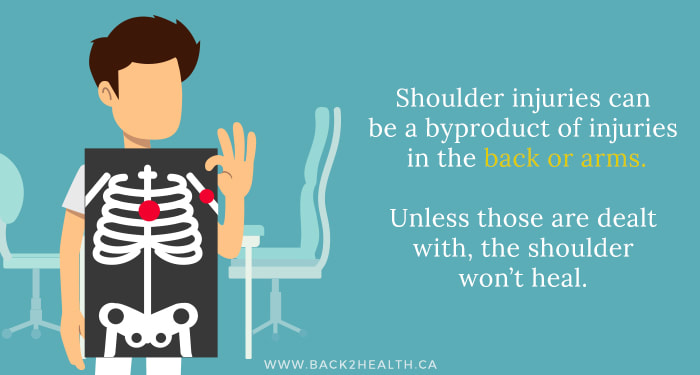The last thing you expect is to have an accident.
One client who is careful during workouts to prevent injury, fell off her bike in the rain on the way to the gym. Another was in a car accident driving home from work.
No one ever wants to get injured. It’s something that we can’t always control, despite our best efforts.
Shoulder injuries are one of the most common injuries affecting adults.
If you are lucky, the injury is minor and you can recover quickly. Others take much longer, or may never have full recovery.
The risk increases depending on a person's job, hobbies, exercise routine, and age, but also can be a result of an unexpected event.
Unfortunately once a shoulder is injured, recovery can be an ongoing process that may linger for years (especially without the right treatment).
Here’s the top 5 reasons shoulder injuries are so hard to recover from.
One client who is careful during workouts to prevent injury, fell off her bike in the rain on the way to the gym. Another was in a car accident driving home from work.
No one ever wants to get injured. It’s something that we can’t always control, despite our best efforts.
Shoulder injuries are one of the most common injuries affecting adults.
If you are lucky, the injury is minor and you can recover quickly. Others take much longer, or may never have full recovery.
The risk increases depending on a person's job, hobbies, exercise routine, and age, but also can be a result of an unexpected event.
Unfortunately once a shoulder is injured, recovery can be an ongoing process that may linger for years (especially without the right treatment).
Here’s the top 5 reasons shoulder injuries are so hard to recover from.
1. Shoulders are the most mobile joints your body
While this mobility allows humans to accomplish complicated tasks, it also causes problems.
Like our hips, the shoulder joint works on a ball and socket system. But unlike our hips, which have deep sockets, in the shoulder, the ball (which is the head of the humerus) does not have a deep cavity to slide into.
The shoulder socket is way more shallow than the hip socket, which is why our shoulders have a wider range of mobility than our legs.
High mobility is also guaranteed by a complex network of tendons and ligaments (in addition to cartilage) that hold the shoulder in place and allow it to move freely. But what the shoulder gains in mobility, it lacks in stability.
In other words, the system is so complex (and fragile) that there are so many ways in which it can go wrong.
Like our hips, the shoulder joint works on a ball and socket system. But unlike our hips, which have deep sockets, in the shoulder, the ball (which is the head of the humerus) does not have a deep cavity to slide into.
The shoulder socket is way more shallow than the hip socket, which is why our shoulders have a wider range of mobility than our legs.
High mobility is also guaranteed by a complex network of tendons and ligaments (in addition to cartilage) that hold the shoulder in place and allow it to move freely. But what the shoulder gains in mobility, it lacks in stability.
In other words, the system is so complex (and fragile) that there are so many ways in which it can go wrong.
2. It's hard to get the right diagnosis
Given the complexity of the shoulder joint and the many different injuries that can affect it, getting a proper diagnosis can be difficult.
This can have a detrimental effect on the recovery process, since you may not get the appropriate rehabilitation for your injury.
Getting a correct (and timely) diagnosis is one important key to a speedy recovery.
So don’t grit your teeth and wait to see if it works itself, it’s better to be safe and get it assessed straight away.
This can have a detrimental effect on the recovery process, since you may not get the appropriate rehabilitation for your injury.
Getting a correct (and timely) diagnosis is one important key to a speedy recovery.
So don’t grit your teeth and wait to see if it works itself, it’s better to be safe and get it assessed straight away.
3. It's a difficult area to rest
Like in most musculoskeletal injuries, shoulder injuries tend to require a period of rest.
But unlike other areas of the body, the shoulder is essential to perform most basic daily tasks.
This makes it difficult to rest the area for enough time to aid the recovery process.
But unlike other areas of the body, the shoulder is essential to perform most basic daily tasks.
This makes it difficult to rest the area for enough time to aid the recovery process.
4. Shoulder injuries often go beyond the shoulder
Recovery can also be delayed or complicated because shoulder injuries are often part of problems beyond the shoulder itself.
The shoulder is tied to other body parts, mainly muscles and tendons on the back and arms. Because of this close connection and because of the shoulder's complexity, pain and injuries in the region might be a byproduct of injuries that are actually occurring in the back or arms.
This means that unless the origin of the injury is dealt with, the shoulder will not heal.
The shoulder is tied to other body parts, mainly muscles and tendons on the back and arms. Because of this close connection and because of the shoulder's complexity, pain and injuries in the region might be a byproduct of injuries that are actually occurring in the back or arms.
This means that unless the origin of the injury is dealt with, the shoulder will not heal.
5. Re-injuring the shoulder is common
Once an injury occurs in your shoulder, muscle coordination gets disrupted. This may cause the injury to repeat itself.
The muscles may begin overcompensating or become tired and not function properly. This may cause repeated strains, making it very difficult to recover from.
The muscles may begin overcompensating or become tired and not function properly. This may cause repeated strains, making it very difficult to recover from.
What to do if you're experiencing sharp pain in your shoulder
If you're experiencing new or recurring pain in your shoulder, there are a few things you can do.
1. Rest your shoulder. If you just started experiencing pain, don't panic. Your shoulder might just be inflamed because of a fall or a bruise. Refrain from any physical activity to avoid further damage and to allow the swelling to go down.
2. Book an appointment with a Vancouver chiropractor. This will help you to get a diagnosis on your injury, and begin the recovery process. It can also help you to reduce pain by having your body placed into the optimum position for healing.
~Dr. Guenette & Dr. Hennessy
1. Rest your shoulder. If you just started experiencing pain, don't panic. Your shoulder might just be inflamed because of a fall or a bruise. Refrain from any physical activity to avoid further damage and to allow the swelling to go down.
2. Book an appointment with a Vancouver chiropractor. This will help you to get a diagnosis on your injury, and begin the recovery process. It can also help you to reduce pain by having your body placed into the optimum position for healing.
~Dr. Guenette & Dr. Hennessy



 RSS Feed
RSS Feed
